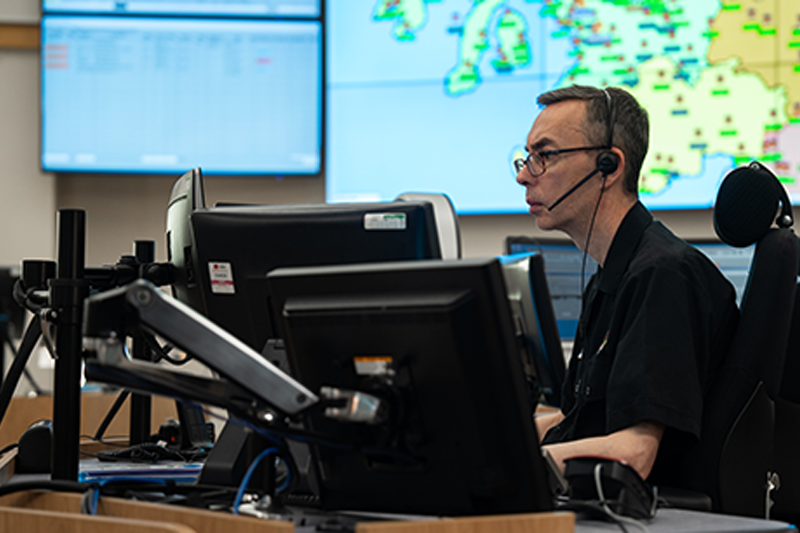What is Raneem’s law?
Raneem’s law honours Raneem Oudeh, who was murdered along with her mother Khaola Saleem, by Raneem’s estranged husband, Janbaz Tarin, in 2018. Raneem had made 13 reports to the police concerning Tarin – including four on the night she was killed.
In an effort to prevent similar tragedies happening, specially trained Independent Domestic Violence Advisors (IDVAs) will now be on hand to support CROs.
An inquest into the women’s deaths found the control room wasn’t equipped to handle the complexity of her domestic abuse calls. Officers were unable to complete the appropriate risk assessments and criminal investigations into Tarin, and Raneem’s calls were dealt with in isolation.
In an effort to prevent similar tragedies happening, specially trained Independent Domestic Violence Advisors (IDVAs) will now be on hand to support CROs. They will respond to victims and connect them to support services, as well as escalating risk assessments more quickly. When fully rolled out, the initiative could include several more requirements for the control room. This has raised concerns that an already heavily-burdened workforce could be overwhelmed by the changes, which could impact the quality of 999 responses.
According to an independent inquiry into Raneem and her mother’s deaths, satisfactory intelligence checks weren’t carried out and there was a lack of communication between departments, which impacted the police response. With regards to women’s safety, the Government has already taken steps towards bridging communication gaps. They have developed the data requirements for civil orders, and implemented improved electronic links – to facilitate better information sharing between family courts and police forces.
Although the entire requirements of Raneem’s Law are still in development, your force can immediately take the following steps to proactively prepare for the changes:
1. Supply CROs with essential caller information
Critical contact information should be immediately visible to an operator – including historical data such as background checks and warning markers against people, locations or vehicles.
Critical contact information should be immediately visible to an operator – including historical data such as background checks and warning markers against people, locations or vehicles. Equipping CROs with this information would mean they could alert police to high-risk situations immediately, preventing serious situations from escalating to life-threatening levels.
2. Streamline your processes
Operators are struggling to maintain call quality due to the overwhelming number of 999 calls and the limitations of outdated software. Thorough information isn’t being captured and logged sufficiently, and repeat callers – or calls relating to the same incident – are being handled independently. As a result, police aren’t given all the facts associated with a case quickly enough. To protect vulnerable people, CROs must be supported with the right technology so they can process calls promptly, yet still capture all the necessary information.
3. Make exchanging information more straightforward
Working alongside CROs, IDVAs will provide advice and support so domestic abuse calls can be handled more quickly and effectively. This may mean they need to share information relating to an incident with another force; they may require support from specialist charities or a dedicated translator. To maintain confidentiality, the system should facilitate this collaboration, allowing information to be transferred seamlessly – either in a call or via secure server – instantly.
Transforming control room technology
The shocking murders of Raneem and her mother highlighted that existing control room technology isn’t able to support the needs of domestic abuse victims. Motorola Solutions’ cloud-based Guardian Integrated Communications Control System (ICCS) was designed to alleviate the amount and the complexity of an operator’s tasks. It improves workflows and makes it easier to manage incidents and collaborate.
Within the platform is an advanced contact management solution, which has multiple benefits:
Makes operators immediately aware of associated caller data
Every time an individual calls 999, Guardian ICCS automated data entry feature retrieves all the other relevant information held on them – including any previous contact they’ve had with the police.
Every time an individual calls 999, Guardian ICCS automated data entry feature retrieves all the other relevant information held on them – including any previous contact they’ve had with the police. CROs can instantly assess a situation’s level of urgency, and allocate resources accordingly – without needing to launch a manual search. This empowers operators to instantly identify high-risk situations, preventing delays that put lives at risk.
Captures information quickly and accurately
With each answered call, the contact management tool automatically generates a new call record, including auto-populated fields and predefined choices. This encourages the operator to ask the right questions according to the nature of the call – key details are documented and the call handling process becomes more efficient.
Streamlines operator workload
As relevant caller information – personal details, location data and specifics of previous contact made with the emergency services – is automatically populated by the contact management tool, the manual data entry a call requires is reduced. This allows the CRO to record incidents more quickly and accurately, decreasing contact time so they can prioritise urgent decision-making.
To find out how Motorola Solutions can enable CROs to offer enhanced support to 999 callers and improve outcomes for victims of crime, book a demo with them today.

About the author
Mark Swift leads Control Room Business Development at Motorola Solutions, drawing from an extensive background in managing mission-critical operations. He brings significant expertise in control room solutions and strategic planning following a 26 year career in public safety with the Metropolitan Police, where he oversaw complex command and control operations. At Motorola Solutions, he focuses on delivering comprehensive communication solutions, ensuring clients have the tools they need to succeed. Mark’s customer-centric approach and deep industry knowledge make him a trusted advisor in the public safety sector.
 Motorola Solutions is a global leader in public safety and enterprise security. Our solutions in land mobile radio communications, video security & access control and command center software, bolstered by managed & support services, create the most integrated technology ecosystem built specifically for public safety and enterprise organisations that shares knowledge across your entire operation, enabling powerful collaboration, streamlining workflows, boosting performance and improving outcomes.
Motorola Solutions is a global leader in public safety and enterprise security. Our solutions in land mobile radio communications, video security & access control and command center software, bolstered by managed & support services, create the most integrated technology ecosystem built specifically for public safety and enterprise organisations that shares knowledge across your entire operation, enabling powerful collaboration, streamlining workflows, boosting performance and improving outcomes.


